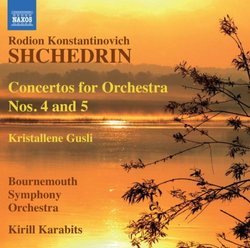| All Artists: Bournemouth Symphony Orchestra Title: Shchedrin: Concertos for Orchestra, Nos. 4 and 5 Members Wishing: 0 Total Copies: 0 Label: Naxos Original Release Date: 1/1/2010 Re-Release Date: 4/27/2010 Genre: Classical Style: Symphonies Number of Discs: 1 SwapaCD Credits: 1 UPC: 747313240579 |
Search - Bournemouth Symphony Orchestra :: Shchedrin: Concertos for Orchestra, Nos. 4 and 5
 | Bournemouth Symphony Orchestra Shchedrin: Concertos for Orchestra, Nos. 4 and 5 Genre: Classical
The distinguished Russian composer, pianist and teacher Rodion Shchedrin writes: 'I spent my childhood in — the small Russian town of Aleksin, situated on the river Oka, 300 kilometres south of Moscow. My grandfather was an... more » |
Larger Image |
CD DetailsSynopsis
Product Description The distinguished Russian composer, pianist and teacher Rodion Shchedrin writes: 'I spent my childhood in the small Russian town of Aleksin, situated on the river Oka, 300 kilometres south of Moscow. My grandfather was an Orthodox priest there. When I was growing up, purely entertaining, commercial music was not yet as ubiquitous as it is now on television, radio, in stations, sea-ports and shops It was still possible to hear choral songs, the sound of the accordion, the strumming of the balalaika, funeral laments, the cries of shepherds at dawn, coming from beyond a river, enveloped in fog. All that distant and now extinct musical atmosphere of a Russian province is strongly etched in my childhood memories. I think, in all three compositions on this CD, it has found it own nostalgic echo.' All three works are world première recordings. Similar CDs
|
CD ReviewsShchedrin's Concertos for Orchestra Tom J. Godell | Lexington KY USA | 06/13/2010 (4 out of 5 stars) "When Rodion Shchedrin began his musical career, Joseph Stalin was at the height of his post-war power. Long after the bloody dictator's death--not to mention the ignominious end of the Soviet Union itself--Shchedrin continues to thrive and create vital, compelling music. These three vividly colorful examples were written between 1989 and 1999. Concerto 4 is first on the program, and it is by far the most compelling and easily accessible score. The sub-title means "Round Dances" or "Roundelays", and the spirit and vitality of Russian folk dancing is never far beneath the surface. Despite the nationalist inspiration of the music, the themes are all Shchedrin's--"my own innocent vision", as he comments in the booklet. The work is cast in a single movement of nearly a half hour in length, but it is divided into three distinct dances followed by a coda that recalls the score's ethereal opening passage. Shchedrin has always been a master of orchestral color, even as early as his First Piano Concerto, written while he was still a conservatory student. Then, as now, he was deeply influenced by the greatest of his predecessors: Prokofiev, Shostakovich, and Khachaturian. That influence is still obvious in this delightful Concerto. For example, the passage for two flutes at the beginning of the second dance recalls the 11th Symphony of Shostakovich, while the blazing climax at the end of the third seems to be a direct descendent of Prokofiev's Scythian Suite. That said, there's plenty of originality and creativity on display here. The opening is a masterstroke: a haunting, melismatic solo by an alto recorder accompanied by two flutes imitating the sound of the rushing wind. Shchedrin also makes creative use of the harpsichord and an enormous battery of percussion instruments. Anyone who has heard Shchedrin's Carmen Ballet is aware that this composer knows his way around the orchestra's percussion section. Also given his experience with ballet, Shchedrin has become a superb dramatist, and that skill is also evident here. The result is attractive, exciting, and often ethereally beautiful--well deserving of a place in the modern orchestral repertory. Concerto 5 is shorter, darker, and less immediately appealing. Perhaps the subtitle ("Four Russian Songs") is part of the problem. If you're expecting a light-hearted romp in the style of Anatol Liadov's Eight Russian Folksongs, you'll be sadly disappointed. Shchedrin's songs are for the most part dark and brooding. Moreover, the orchestral colors have been muted and the dynamics are mostly subdued, which makes the rare fortissimo outbursts even more surprising. Although there are four songs, the work is clearly divided into six sections, each easy to distinguish thanks to Andrew Burn's helpful booklet essay. Crystal Psaltery is the shortest and most recent work on the program. It's a study in sonority inspired by and written for Japanese composer Toru Takemitsu. According to Shchedrin, "There are echoes of (Takemitsu's) `watercolor' compositional aesthetics to be heard here." It's a haunting nine minute score that soon has the listener feeling suspended in time. The playing of the Bournemouth Symphony is exemplary--as is the clarity and richness of the recorded sound. Young maestro Karabits is an alert, sensitive leader with an excellent sense of drama. Let's hope Naxos brings us more of his art in the future. We urgently need his recordings of the other Shchedrin Concertos for Orchestra, not to mention the composer's fascinating Piano Concertos. Urgently recommended to anyone with an interest in 20th century Russian orchestral music. " THE BEST MUSIC TO COME OUT OF RUSSIA SINCE SHOSTAKOVICH!! G. Chandler | San Francisco, CA USA | 06/11/2010 (5 out of 5 stars) "The one review for this CD here, by John B. Meagher, is *so bad* (and incredibly stupid), it inspired me to write this review. (And this CD deserves a 5-star review anyway!)
This is some of the most original classical music I've ever heard. And that's coming from someone who's heard thousands of classical music CDs (thanks to all the libraries in my city *and* Amazon of course). I personally don't like to spend my time reading L O N G reviews on Amazon, so I'll keep this short. You will not hear better orchestral writing than on these three brilliant compositions. Highly intelligent, lyrically imaginative, crystalline-like transparency in the beautiful sonorities, and world-class playing by this U.K. orchestra. With demonstration-like sonics, and at a budget price, this is what you would call a 'no-brainer'! You will NOT be disappointed. Shchedrin is Russia's greatest living composer and this disk is instant proof of that debatable claim. I hope this helps with only that one-star review to go on. (And a note to Mr. Meagher - do yourself and everyone else a favor - DELETE your review. How embarrassing.)" |

 Track Listings (3) - Disc #1
Track Listings (3) - Disc #1

